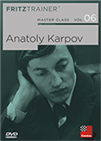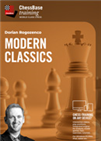Throughout chess history, there have often been two players who have dominated over all others of their time, leading to the question: which of the two is better? The answer, of course, can only really be determined in a match. The first such rivals were De La Bourdonnais and McDonnell, who played six matches (and a mammoth 85 games) in 1834, with De La Bourdonnais winning. A few years later, the dominant players were Staunton and De Saint-Amant, and Staunton proved superior in their 1843 match. These matches, though intense and important for chess development, were not official – there was no world championship title at the time.
 On this DVD a team of experts looks closely at the secrets of Karpov's games. In more than 7 hours of video, the authors examine four essential aspects of Karpov's superb play.
On this DVD a team of experts looks closely at the secrets of Karpov's games. In more than 7 hours of video, the authors examine four essential aspects of Karpov's superb play.Fast-forward to more recent times, and the chess world has seen a number of significant rivalries, such as Botvinnik and Smyslov, who competed in three matches: the first ended in a draw, Smyslov won the second, and Botvinnik won the third. In 1966 and 1969, Petrosian and Spassky played two matches for the world chess championship, with Petrosian winning the first and Spassky the second. Between 1974 and 1981, Karpov and Korchnoi played three matches, all won by Karpov.
From 1984 to 1990, Garry Kasparov and Anatoly Karpov played five matches for the world championship, an absolute record to this day. The first match was unfinished, stopped at 5–3 in Karpov’s favor. Kasparov won the second and third, the fourth ended in a draw, and Kasparov won the fifth. These matches were major events, leading to analyses in every chess magazine of the time and, subsequently, the publication of many books. Kasparov first wrote a book about the second and third matches, with one move analyzed over 27 pages! After finishing his playing career, he commented deeply on all of his matches with Karpov in three exceptional books. Grandmaster Jan Timman also wrote about them in 2019, publishing The Longest Game through New in Chess.
This article focuses on the decisive moment of their fourth match: the 24th and final game, played in Seville in 1987. After 23 games, the score was 12–11 in Karpov’s favor, putting Kasparov in a must-win situation to retain his title. In his later commentary, Kasparov revealed his plan for that game: to play a long and complex game. The game itself was not of the highest quality – Karpov, in an equal position, took a poisoned pawn with 31…Nxa4?, and Kasparov had a clear win. Instead of winning in style with 33.Qb5!, Kasparov misplaced his queen with 33.Qd1, making the position equal again. Karpov then played 33…Ne7?
This article analyzes whether that move lost the game – leaving him a pawn down. In response, Kasparov played the safer but weaker 34.Qd8, rather than 34.Bh5!
At that time, games were adjourned after five hours of play and 40 moves, to be resumed the next day. This game was adjourned at move 42, and that position is the subject of this article.
The Position and Moves to the End
 Top trainers strongly recommend regular study of well-explained classical games to improve your understanding of chess in the long term. 33 modern classics are explained in details on this video course.
Top trainers strongly recommend regular study of well-explained classical games to improve your understanding of chess in the long term. 33 modern classics are explained in details on this video course.White had an extra pawn but faced difficulties in converting it, as all pawns were on the same wing. Another problem was a "bad bishop"—if Kasparov ended up with just a rook pawn, the position would be a draw (Karsten Müller uses the term "color-blind bishop"). During the evening, most analyses suggested the advantage would be enough for a win, and the next day, Kasparov indeed managed to win. He won the game, the match ended in a draw, and Kasparov retained his world champion title.
In all known commentaries, the adjourned position is evaluated as winning for White. The only note of doubt comes from Kasparov himself: "True, I am still not sure whether this was good enough to win" (Source: Garry Kasparov on Modern Chess, Part 3: Kasparov vs. Karpov 1986–1987, published in 2009). But the general consensus of chess literature to this day is that Kasparov's position is winning.
The question for our readers: is this really the case? Was Karpov’s move 33…Ne7 a losing mistake and had Kasparov retained a winning advantage through to the adjournment position?
And two more questions: In the above-mentioned book, Kasparov states that the move 42... g5 was weak, giving the variation: "43. f4! Qf6 44. Kh3 gxf4 45. exf4, etc." Was Kasparov right?
The third question is: In his excellent book, The Longest Game, Timman claims that if Black had played 45... Nd7 (see the variation in the game), he would have lost anyway. Is this analysis correct?
We hope our readers will help us find the truth.
 This riddle was posed by Gady Costeff, who is an Israeli-American chess composer, computer scientist, and marketing analyst. Born on May 7, 1961, he is renowned for his contributions to chess artistry, particularly in the realm of endgame studies. Costeff has composed over 100 chess studies and is celebrated for his creativity and technical expertise in chess composition.
This riddle was posed by Gady Costeff, who is an Israeli-American chess composer, computer scientist, and marketing analyst. Born on May 7, 1961, he is renowned for his contributions to chess artistry, particularly in the realm of endgame studies. Costeff has composed over 100 chess studies and is celebrated for his creativity and technical expertise in chess composition.


















 This riddle was posed by Gady Costeff, who is an Israeli-American chess composer, computer scientist, and marketing analyst. Born on May 7, 1961, he is renowned for his contributions to chess artistry, particularly in the realm of endgame studies. Costeff has composed over 100 chess studies and is celebrated for his creativity and technical expertise in chess composition.
This riddle was posed by Gady Costeff, who is an Israeli-American chess composer, computer scientist, and marketing analyst. Born on May 7, 1961, he is renowned for his contributions to chess artistry, particularly in the realm of endgame studies. Costeff has composed over 100 chess studies and is celebrated for his creativity and technical expertise in chess composition.




